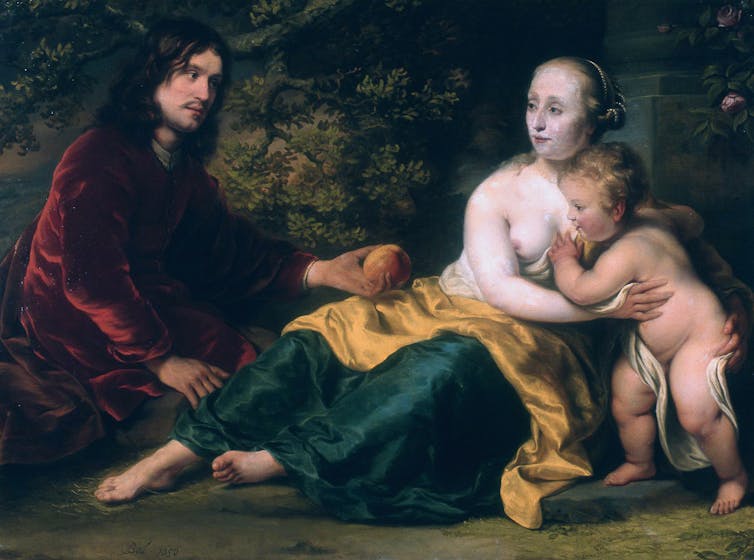3 ways philosophy can help us understand love
- Written by Hugh Breakey, President, Australian Association for Professional & Applied Ethics. Senior Research Fellow, Moral philosophy, Institute for Ethics, Governance & Law, Law Futures Centre., Griffith University
Love can seem a primal force, an intoxicating mix of desire, care, ecstasy and jealousy hard-wired into our hearts. The polar opposite of philosophy’s measured rationality and theoretical speculations.
Yet if you take any topic in the world, and keeping asking deep questions of it, you will ultimately wind up doing philosophy. Love is no different.
Indeed, many famous philosophers— Kant, Aristotle, De Bouvier — wrote about love and how it fitted into their larger theories of human reason, excellence and freedom.
Unsurprisingly, their historically-situated views tended to mirror the culturally valued types of love in their time. The Greeks eulogised the love of friendship. Scholars in the middle ages ruminated on the love of God. With the Renaissance, romantic love moved centre stage.
Today, philosophers continue to interrogate love and draw practical lessons about how we can approach it in our own lives.
 Philosophers continue to interrogate the nature of love.
Véronique Harter George, CC BY-NC-SA
Philosophers continue to interrogate the nature of love.
Véronique Harter George, CC BY-NC-SA
Read more: Friday essay: finding spaces for love
What is love?
Think of the ways in which we distinguish love from other similar qualities. We can easily imagine someone saying: “It’s not love — they’re just friends.” Or “It’s not love —it’s just infatuation.”
Ideally, an account of love would distinguish it from (on the one hand) liking, friendship, respect, admiration and care, and (on the other) lust, infatuation and obsession. Love seems deeper than and different from these.
Perhaps we also need to consider whether we use the word love in different ways. When we speak of loving books, or a band, or our pets, are we using the same concept as when we speak of love of people?
 Józef Simmler’s portrait of Diotima of Mantinea. Her ideas and doctrine of Eros as reported by Socrates are the origin of the concept of Platonic love.
Wikimedia Commons
Józef Simmler’s portrait of Diotima of Mantinea. Her ideas and doctrine of Eros as reported by Socrates are the origin of the concept of Platonic love.
Wikimedia Commons
Even focusing on love of people, we may want to distinguish between types of love — such as the passion shared by two honeymooners, compared to the committed companionship of an elderly married couple. Some might mark the distinction by saying the honeymooners are “in love”, while the elderly couple “love one another”.
Early philosophers, including Plato, Aristotle and St Augustine, developed intriguing concepts here, distinguishing eros (passionate desire) from philia (friendship) and agape (universal brotherly love).
Yet other philosophers, such as Susan Wolf, point out that, despite distinctions in their early stages, different types of love tend to grow more similar over time. Perhaps this suggests there is an underlying, shared essence of love.
The essence of love
Imagine you asked yourself what love is really, ultimately about. What would your answer be?
Would you say love is an emotion? Love can seem a perfect example of an emotion. However, compared to emotions like anger or sadness, love’s mental states are strangely changeable. Love can make us daydream and swoon — but equally it can drive us to jealousy, loss, confusion, aspiration, ambition and more. Love is not one feeling, but the fount of many.
Read more: There are six styles of love. Which one best describes you?
Perhaps you might instead focus on love as desire — either to improve the beloved’s life, or (in the case of romantic love) to be with them emotionally and physically. (Of course, the desire to be with the beloved often overlaps with the desire to do what is best for them. But tragedy is not far away when these two desires pull in different directions.)
Or you might wonder if love is a profound type of recognition — the ability to really see into another person’s normally hidden depths, and to realise how profound and important they are.
These are all good answers. Different philosophers defend each of these approaches, finding insight in each. One of the nice things about philosophy is that there may be no single correct answer to these questions. Some people might even hold that love is inherently ineffable — incapable of rational definition.
A puzzle
One important part of any account of love will include the way we value the beloved. But this presents an intriguing puzzle. We feel like we love another person on the basis of their lovable properties. We love them for their kindness, charm, beauty, intelligence, depth, sense of humour, or their eyes or smile. And we feel like we want to be loved by others on the basis of our own virtues.
 Loving someone means we resist ‘trading up’.
shutterstock
Loving someone means we resist ‘trading up’.
shutterstock
While this seems reasonable, a moment’s reflection shows it can’t be right. If we really loved someone purely on the basis of their desirable properties, then we should rationally “trade up” any time someone came along who was even more beautiful and intelligent. But that’s not how love works. We love the whole person, not just their particular qualities, which might come and go.
But equally, it can’t be that we love someone just “because”, on the basis of no reasons whatsoever. That seems unsatisfying, and doesn’t mesh with the fact there clearly are things about our beloved that we cherish and that anchor our attraction. Equally, if our beloved starts treating us badly, we can respond to that — perhaps ultimately by withdrawing our love. We aren’t simply condemned to go on loving the person even when we have no reasons to do so.
Love as a verb, love as a history
Another dimension of love is the fact that love is not a simple state of existence, but occurs over and through time. After all, love is not only a noun, it’s also a verb.
Loving is an intention and an action that has consequences, and like other actions, it’s one that we can be responsible for and accountable for. Even though we can fall in love, it remains something that we can make choices about — we can work to remain in love, and we can strive to free ourselves from it.
For this reason, some philosophers, such as Raja Halwani, have stressed that love is ultimately about commitment.
 Love occurs over time.
shutterstock
Love occurs over time.
shutterstock
It is when we start to own our feelings for another person, and become responsible for them, that love occurs. When we are merely gripped by them, or overthrown by them, it is just obsession or infatuation. From there it is up to us to commit, and this is where genuine love — love as a verb — emerges.
There is another way love occurs over and through time. The love between two people arises from a historical process in their lives. As romance books remind us, love often presents as a story, with events occurring between two people that change and challenge them as they come together and (all going well) seek to create a new union — a “we”.
(Of course, for romantic love, chemistry matters too. There is no guarantee that two people will “fit” merely because they both have wonderful virtues and compatible values.)
In other words, to say that a person is in love is not purely a statement about emotion or value. It is also telling us something about their history. They have lived and grown through their experiences with the beloved, and this has led to their deep attachment. This is at once one of the glorious parts of love, empowering intimate shared experiences, even as it is a way that drives the process of love forward.
One of the reasons we love him rather than someone else, is because we have had special intimate experiences with him, grown with him, shared memories with him, created a life with him.
The ethics of love
Is love ethically justifiable?
In many ways, love can seem like a moral danger. Love is often “blind” — it can beguile us into seeing the world wrongly. Love also stops us valuing others impartially — which can seem like the exact opposite of what ethics requires of us.
 Edward Burne-Jones, Love Among the Ruins:
Wikimedia Commons
Edward Burne-Jones, Love Among the Ruins:
Wikimedia Commons
Also, love has a complex relationship with autonomy: the capacity to direct and control our lives, and a central part of being a free and responsible human being.
Love can threaten autonomy. When we invest emotionally in another person, plan our lives around them, and start to feel their gains and losses as our own, we relinquish the amount of control we have over both big and small life decisions.
Still there is another side to love, which sees it as ethically critical. After all, love extends us beyond ourselves, giving us an attachment to others that pushes us out of self-interested and self-absorbed ways.
The way we value our beloved can even parallel moral respect. We value and desire the person in and for themselves, similar to the way morality requires us to respect others for their own sake.
Finally, as far back as Socrates and Plato was the idea that love uplifts us morally by letting us see value and beauty in the world. By giving us reasons to live and get out of bed in the morning, love makes us aware the world houses wonderful, inspiring things, worthy of our care and protection.
Lessons
These philosophical ideas about love suggest some practical lessons.
First, love is complex and ambiguous — if thoughtful philosophers can’t agree on its qualities, different people may understand it in different ways.
This depth of disagreement matters. It means someone might truthfully say, “I love you”, but they might mean something completely different from what we imagine. They might be speaking of desire and passion, where we think of commitment and togetherness.
Secondly, love involves vulnerability — and therefore risk. All the features of love noted above — desire, value, commitment, care — create vulnerabilities. Love makes us open ourselves up for another person, showing intimate parts of ourselves, and hoping the support and care we feel for them will be reciprocated.
 Ferdinand Bol, Portrait of Wigbold Slicher and Elisabeth Spiegel as Paris handing Venus the Apple, 1656.
Wikimedia Commons
Ferdinand Bol, Portrait of Wigbold Slicher and Elisabeth Spiegel as Paris handing Venus the Apple, 1656.
Wikimedia Commons
It is a difficult thing to pour so much concern, admiration and desire onto someone, investing our time and precious experiences into them, even defining ourselves in terms of them and feeling their pains as our own, if they do not meet us halfway.
Unfortunately, we often respond to being vulnerable by taking control. In some ways, this is healthy. It can prompt us to make sensible decisions about managing our lives. We can decide that a relationship is toxic or not good for us, and work to improve matters or to leave.
But there is a dark side to this desire for control. We may respond to our emotional vulnerability by trying to control parts of our beloved’s life. This can be harmful to them, and to the relationship. For this reason, care and respect are vital in relationships of love.
Thirdly, if we want to love, we must learn to love a changing person. As we saw above, there is a sense in which we love both the person themselves, and also their lovable qualities.
This gives rise to a practical challenge in maintaining love. We are challenged to continue finding lovable attributes in our partner, and creating new experiences with them, even as they change and grow.
And at the same time, we are challenged to keep nurturing our own lovable properties and virtues, to ensure our partner has continuing reason to remain in love with us.
Ultimately, love may be too wonderfully multifarious and dynamic to be pinned down by a definition or philosophical theory. But we can still benefit from thinking deeply about love’s nature and the challenges and promises it presents.
Hugh Breakey is the author of the romance novel The Beautiful Fall.
Authors: Hugh Breakey, President, Australian Association for Professional & Applied Ethics. Senior Research Fellow, Moral philosophy, Institute for Ethics, Governance & Law, Law Futures Centre., Griffith University
Read more https://theconversation.com/friday-essay-3-ways-philosophy-can-help-us-understand-love-155374



















